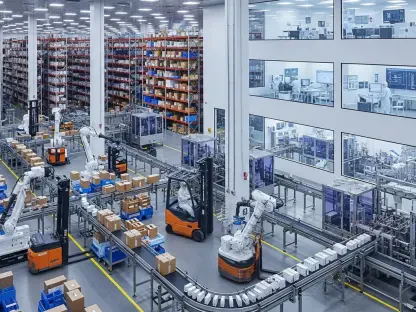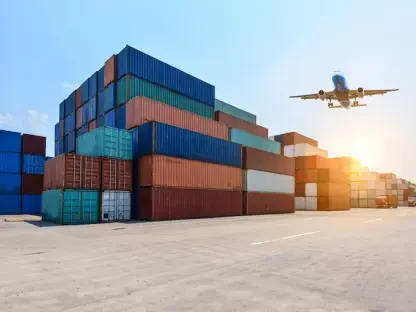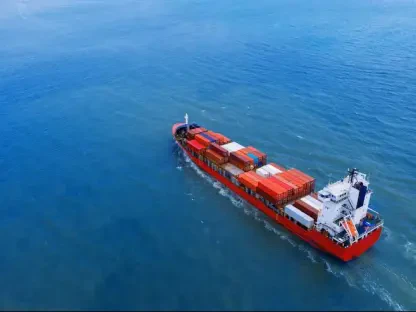The air cargo industry is undergoing a significant transformation with the integration of artificial intelligence (AI), a technological shift spearheaded by CargoTech, a leading technology group committed to enhancing decision-making within the industry. Cédric Millet, President of CargoTech, along with various members of the organization, explores how AI can bolster business decisions and dispels some common myths about the technology. They emphasize AI’s potential to revolutionize the industry by offering streamlined decision-making tools and fostering a more efficient business environment. However, they also acknowledge the prevalent challenges and the current stage of AI adoption within the sector.
Early Stages of AI Adoption in Air Cargo
The air cargo industry is still in the early stages of embracing AI-assisted decision-making, rated at a modest 3 on a scale of 1 to 10 by Cédric Millet. Currently, AI is used sporadically across different segments, mainly for customer service and engagement, resembling digital processes in more advanced industries. One of the industry’s primary objectives is to digitize operations and accumulate substantial data volumes necessary to train AI models, identify anomalies, and make informed decisions moving forward. Fragmentation of data across various stakeholders remains a significant hurdle for the air cargo industry, resulting in inefficiencies that can hinder the overall adoption of AI technology.
CargoTech’s subsidiary, CargoAi, aims to address these challenges by offering sophisticated AI-driven tools designed to facilitate streamlined decision-making for logistics professionals. For instance, their CargoCOPILOT product, an AI email plugin, enables frontline workers to retrieve dynamic rates directly through their inbox without having to search across multiple platforms. By synthesizing data across the supply chain, AI has the potential to provide enhanced end-to-end visibility and improve decision-making processes, thereby driving the industry toward greater efficiency and effectiveness. The progression from sporadic AI usage to widespread implementation hinges on overcoming these initial challenges and paving the way for a more data-driven industry.
Enhancing Commercial Decision-Making
In collaboration with several airlines, CargoTech has developed Rotate’s ‘Fair Share Analysis,’ an AI application aimed at enhancing commercial decision-making processes for air cargo companies. This innovative tool provides insights into airlines’ market positions concerning market share and yield level, which is crucial for optimizing an airline’s network and Origin-Destination (OD) sales mix. By leveraging proprietary capacity data and machine learning algorithms, Fair Share Analysis incorporates market data to generate accurate estimations, enabling airlines to make better-informed commercial decisions, resulting in improved revenue management and efficiency.
The air cargo industry faces the challenge of managing an abundance of data, a stark contrast to the data scarcity it historically dealt with in advanced analysis. This influx of data has led to the proliferation of Business Intelligence (BI) dashboards, stirring excitement about AI’s potential to revolutionize air cargo operations. However, Michael Teoh, Head of Strategy at CargoTech, emphasizes that AI alone cannot solve the industry’s most significant challenges. Instead, it should be viewed as an enabler, complementing the innovative use cases devised by commercial teams to drive value through informed decision-making. In acknowledging AI’s limitations and potential, the industry can harness this technology effectively.
Addressing the ‘Black Box’ Nature of AI
Wiremind Cargo’s CargoStack suite of digital solutions is designed with transparency in mind, aiming to address the commonly cited complaint about AI’s ‘black box’ nature. AI models within the CargoStack suite strive to be highly accurate and offer the best recommendations, but there will undoubtedly be scenarios where human intervention remains necessary. The perceived ‘black box’ issue arises when AI presents a recommended output without revealing the underlying rationale, leading to skepticism and reduced trust among users. Wiremind Cargo addresses this challenge by transparently sharing relevant insights along with model recommendations, thus allowing users to make informed decisions about whether to accept or override the provided outputs.
Since its inception, Wiremind Cargo has successfully implemented AI to benefit the air cargo industry by assisting customers with commercial decisions related to capacity and revenue management. The CargoStack Optimizer modules are powered by various AI models trained on customer data, tasked with making specific predictions, such as the expected amount of baggage on a flight, the show-up rate of bookings, or the optimal entry condition on a flight. By processing vast data sets to identify trends and patterns, these models replicate the analytical work done by human analysts but at a much larger scale, enhancing efficiency and decision-making capabilities across the industry. This holistic approach to AI implementation reinforces the importance of transparency and trust in leveraging AI technology.
Overcoming Data Challenges in Cargo Charters
The cargo charter niche faces distinct challenges, particularly concerning data availability and quality, as crucial data often resides within emails, messages, and other analog channels. For AI tools to be fully integrated, these analog formats must be digitized, a process facilitated by Aerios’ pioneering Carrier App. This application plays a vital role in data gathering, serving as a gateway for implementing AI and machine-learning models in the Aerios product suite. The digitization of analog data ensures that carriers operating cargo charters can harness AI’s full potential, thereby addressing longstanding inefficiencies and driving better decision-making processes.
AI benefits carriers operating cargo charters in two key decision-making areas: long-term planning and the charter operation quotation process. Long-term planning involves determining the appropriate fleet allocation for charters, identifying peak charter lanes, and weighing the benefits of selling charter capacity versus maintaining a scheduled program. With sufficient market data, including common routings, commodity types, and market verticals, AI can help find the optimum balance by offering aggregated market intelligence that supports strategic long-term planning. This capability allows airlines to make more informed decisions and maximize the use of their resources effectively.
AI’s Role in Quotation Processes and Workforce Transformation
The air cargo industry is experiencing a profound transformation driven by the integration of artificial intelligence (AI), with CargoTech at the forefront of this technological evolution. CargoTech, led by President Cédric Millet and a dedicated team, is focused on enhancing decision-making processes within the industry. They examine how AI can improve business decisions and address some common misconceptions about the technology. AI’s potential to revolutionize the air cargo sector is immense, offering tools for streamlined decision-making and creating a more efficient business environment. However, the team also acknowledges current challenges and the existing stage of AI adoption within the industry. These hurdles include the need for better data quality, integration issues, and a general hesitation among industry stakeholders to fully embrace AI. Despite these obstacles, CargoTech remains optimistic about the future, emphasizing that with continued effort and collaboration, AI can significantly elevate the air cargo industry to new heights of efficiency and effectiveness.









